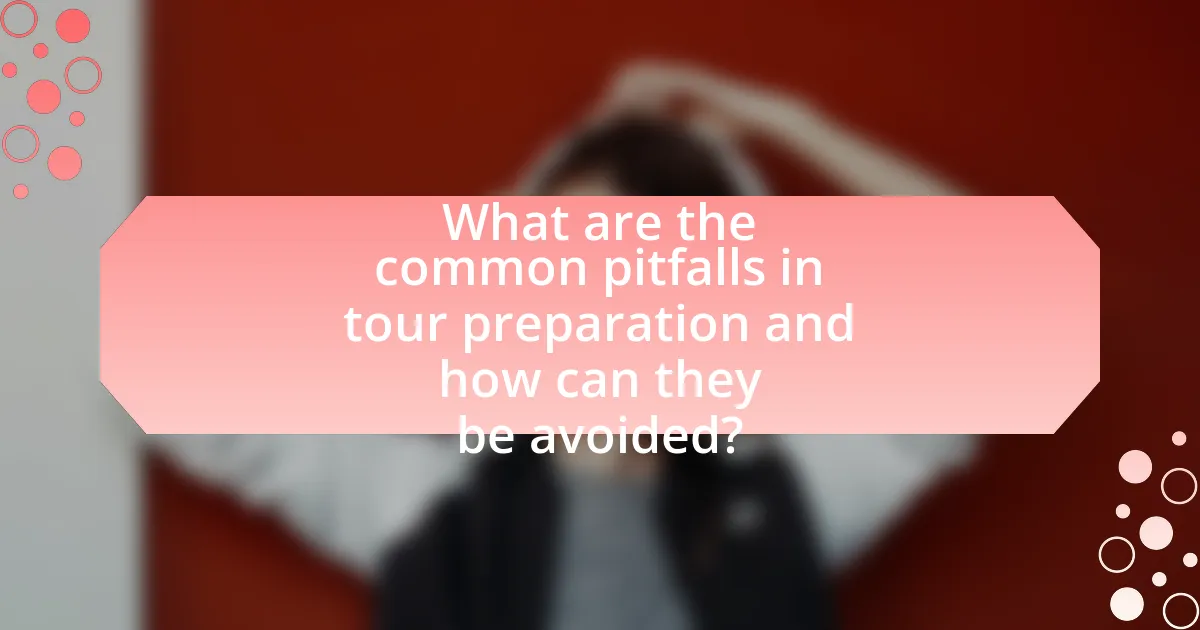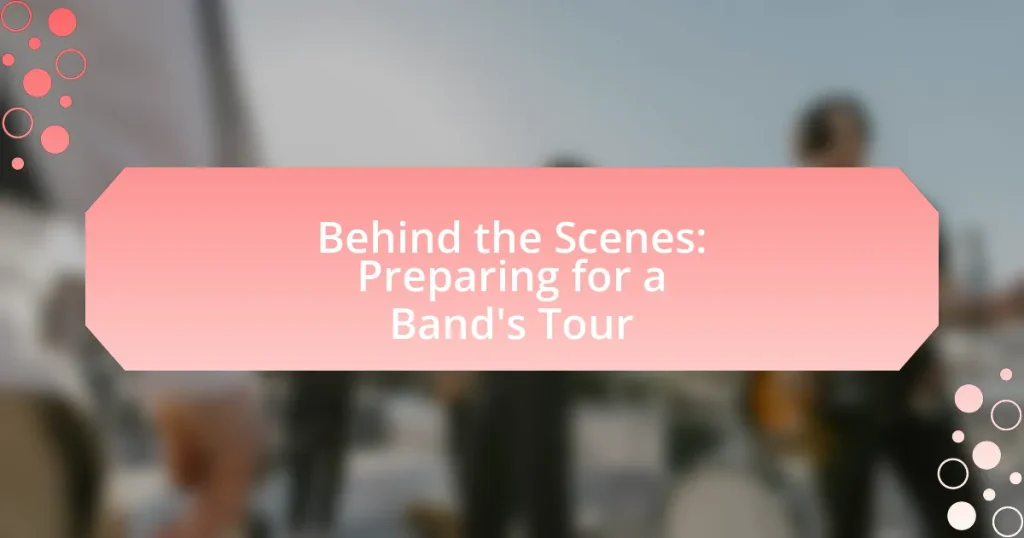The article “Behind the Scenes: Preparing for a Band’s Tour” provides a detailed examination of the extensive planning and coordination required for a successful music tour. It covers essential elements such as scheduling rehearsals, securing venues, managing logistics, and the roles of various team members, including tour managers and sound engineers. The article also discusses factors influencing tour schedules, strategies for audience engagement, and common pitfalls in tour preparation, emphasizing the importance of effective communication and financial planning. Additionally, it highlights the role of technology and industry contacts in facilitating a smooth touring experience.
What does it take to prepare for a band’s tour?
Preparing for a band’s tour requires meticulous planning and coordination across various aspects. Key elements include scheduling rehearsals, securing venues, arranging transportation, and managing logistics such as sound equipment and accommodations. For instance, a successful tour often involves booking venues months in advance, as popular locations can fill up quickly, and coordinating travel arrangements to ensure timely arrival at each destination. Additionally, bands typically create a setlist and rehearse extensively to ensure a polished performance, which is crucial for audience engagement and overall success.
How do bands plan their tour schedules?
Bands plan their tour schedules by analyzing factors such as venue availability, travel logistics, and audience demand. They typically start by selecting key markets based on their fan base and historical ticket sales data, ensuring that they target locations with the highest potential for attendance. Additionally, bands coordinate with booking agents to secure venues and negotiate dates, while also considering the timing of album releases or promotional events to maximize exposure.
For instance, a study by the Music Industry Research Association highlights that successful tours often align with strategic marketing campaigns, which can increase ticket sales by up to 30%. This data underscores the importance of thorough planning and market analysis in the scheduling process.
What factors influence the selection of tour dates and locations?
The selection of tour dates and locations is influenced by several key factors, including market demand, venue availability, and logistical considerations. Market demand is assessed through ticket sales data and fan engagement metrics, which help determine the most popular cities and times for performances. Venue availability is crucial, as bands must coordinate with local arenas or theaters that fit their capacity and technical requirements. Logistical considerations encompass travel distances, local regulations, and seasonal weather patterns, which can impact both the feasibility and success of a tour. For instance, a band may choose to tour in the summer months when outdoor venues are more accessible and fan attendance is typically higher.
How do bands coordinate with venues and promoters?
Bands coordinate with venues and promoters through a structured process involving communication, contracts, and logistical planning. Initially, bands or their management reach out to promoters to discuss potential dates and venues for performances. This communication often includes negotiations on ticket pricing, revenue splits, and technical requirements. Once an agreement is reached, a contract is signed, outlining the responsibilities of both parties, including payment terms and promotional obligations.
Additionally, bands provide promoters with specific technical needs, such as sound equipment and stage setup, ensuring that the venue can accommodate these requirements. Regular updates and meetings may occur leading up to the event to address any changes or issues. This collaborative approach ensures that both the band and the venue are aligned on expectations, ultimately contributing to a successful performance.
What roles are involved in the tour preparation process?
The roles involved in the tour preparation process include tour manager, booking agent, production manager, roadies, and marketing team. The tour manager oversees all logistical aspects, ensuring that schedules are met and resources are allocated efficiently. The booking agent secures venues and negotiates contracts, while the production manager coordinates technical requirements such as sound and lighting. Roadies handle the physical setup and transportation of equipment, and the marketing team promotes the tour to maximize ticket sales. Each role is essential for a successful tour, as they collectively ensure that all operational, technical, and promotional elements are effectively managed.
Who are the key team members in a band’s touring crew?
The key team members in a band’s touring crew include the tour manager, production manager, sound engineer, lighting technician, stage manager, and roadies. The tour manager oversees the entire tour logistics, ensuring that schedules are met and budgets are adhered to. The production manager coordinates all technical aspects of the show, while the sound engineer is responsible for the audio quality during performances. The lighting technician designs and operates the lighting setup, and the stage manager ensures that everything runs smoothly on stage. Roadies assist with the setup and breakdown of equipment, playing a crucial role in the physical execution of the tour. These roles are essential for the successful operation of a touring band, as they contribute to the overall performance experience and logistical efficiency.
What responsibilities does each team member have during the tour?
During the tour, each team member has specific responsibilities that contribute to the overall success of the event. The tour manager oversees logistics, ensuring that schedules are adhered to and that all team members are informed of their duties. The sound engineer is responsible for setting up and managing audio equipment, ensuring optimal sound quality during performances. The lighting technician handles the setup and operation of lighting equipment, creating the desired atmosphere for each show. The roadies assist with loading and unloading equipment, setting up stages, and maintaining gear. The merchandise manager oversees the sale of band merchandise, managing inventory and sales during the tour. Each member’s role is crucial for smooth operations and a successful tour experience.
What logistical challenges do bands face when preparing for a tour?
Bands face several logistical challenges when preparing for a tour, including scheduling, transportation, and equipment management. Scheduling involves coordinating dates and venues, which can be complicated by conflicts with other events or availability issues. Transportation challenges arise from the need to move band members, crew, and equipment across various locations efficiently, often requiring the use of trucks or buses. Equipment management includes ensuring that all necessary instruments and gear are packed, transported, and set up correctly at each venue, which can be logistically complex due to varying venue sizes and technical requirements. These challenges are critical as they directly impact the success and smooth operation of the tour.
How do bands manage transportation and equipment logistics?
Bands manage transportation and equipment logistics by employing dedicated tour managers who coordinate the movement of gear and personnel. These managers create detailed itineraries that outline travel routes, schedules, and necessary accommodations, ensuring that all equipment, such as instruments and sound systems, is securely packed and transported via trucks or vans. Additionally, bands often utilize logistics companies specializing in touring to streamline the process, leveraging their expertise in handling large-scale transport and storage needs. This systematic approach minimizes delays and ensures that all equipment arrives on time for performances, which is critical for maintaining a successful tour schedule.
What strategies do bands use to handle accommodation and travel arrangements?
Bands utilize several strategies to manage accommodation and travel arrangements effectively. They often collaborate with tour managers who specialize in logistics, ensuring that all travel routes and lodging options are optimized for cost and convenience. Additionally, bands frequently book accommodations in advance to secure better rates and availability, often using platforms that cater specifically to the entertainment industry.
To further streamline their travel, bands may employ a dedicated travel agent who understands the unique needs of touring musicians, such as proximity to venues and soundcheck times. Moreover, many bands leverage technology, utilizing apps and software to coordinate schedules and communicate travel plans in real-time, which enhances efficiency and reduces the likelihood of miscommunication.
These strategies are validated by industry practices, where successful tours often rely on meticulous planning and organization to minimize stress and maximize performance quality.

How do bands ensure a successful tour experience?
Bands ensure a successful tour experience by meticulously planning logistics, engaging with fans, and maintaining high performance standards. Effective logistical planning includes securing venues, arranging transportation, and coordinating schedules to minimize delays and maximize efficiency. Engaging with fans through social media and promotional events fosters a loyal audience, which can lead to increased ticket sales and merchandise revenue. Additionally, maintaining high performance standards through regular rehearsals and sound checks ensures that the band delivers quality shows, which is crucial for positive reviews and repeat attendance. These strategies collectively contribute to a successful tour experience, as evidenced by the fact that well-planned tours often see higher attendance rates and greater overall profitability.
What steps do bands take to promote their tour?
Bands take several strategic steps to promote their tour, including leveraging social media, engaging with fans, and collaborating with local promoters. Social media platforms like Instagram, Facebook, and Twitter are utilized to share tour dates, behind-the-scenes content, and promotional materials, reaching a wide audience quickly. Engaging with fans through contests, Q&A sessions, and exclusive content fosters a sense of community and excitement around the tour. Collaborating with local promoters helps bands tap into established networks and gain access to targeted marketing resources, increasing visibility in specific markets. These methods are supported by data showing that social media engagement can significantly boost ticket sales and fan attendance at events.
How do social media and marketing campaigns play a role in tour promotion?
Social media and marketing campaigns are essential tools for tour promotion, as they enhance visibility and engagement with potential audiences. These platforms allow artists to share updates, behind-the-scenes content, and promotional materials directly with fans, creating a sense of connection and anticipation. For instance, a study by the Pew Research Center indicates that 72% of the public uses some form of social media, making it a powerful channel for reaching a broad audience. Additionally, targeted advertising on platforms like Facebook and Instagram can effectively reach specific demographics, increasing ticket sales and attendance. By leveraging these strategies, bands can maximize their promotional efforts and ensure a successful tour.
What partnerships or sponsorships can enhance tour visibility?
Strategic partnerships with brands that align with the band’s image can significantly enhance tour visibility. Collaborating with companies in the music industry, such as instrument manufacturers or music streaming services, can leverage their existing customer base for promotional opportunities. For instance, partnerships with beverage companies or fashion brands can create co-branded merchandise and promotional events, increasing audience engagement. Additionally, sponsorships from local businesses in tour cities can provide financial support while promoting the tour through their marketing channels. Historical examples include major artists partnering with brands like Coca-Cola or Nike, which have resulted in increased visibility and ticket sales through cross-promotional campaigns.
How do bands prepare for live performances during the tour?
Bands prepare for live performances during a tour by conducting rehearsals, organizing setlists, and coordinating logistics. Rehearsals allow bands to practice their songs, refine their performance, and ensure tight musical cohesion. Organizing setlists involves selecting the songs to be played, often considering audience engagement and flow of the show. Additionally, coordinating logistics includes arranging transportation, sound checks, and equipment setup, which are crucial for a smooth performance. These preparation steps are essential for delivering a high-quality live experience, as evidenced by the fact that many successful bands dedicate weeks to rehearsals and planning before hitting the road.
What rehearsal strategies do bands implement before hitting the road?
Bands implement several rehearsal strategies before hitting the road, including structured practice sessions, setlist finalization, and stage blocking. Structured practice sessions allow bands to focus on specific songs, ensuring tightness and cohesion in their performance. Setlist finalization involves selecting and arranging songs to create a flow that engages the audience, often based on previous performance feedback. Stage blocking is crucial for coordinating movements and interactions among band members, enhancing the visual aspect of the performance. These strategies are supported by industry practices, where successful tours often rely on meticulous preparation to ensure a polished and engaging live show.
How do bands adapt their setlists for different audiences?
Bands adapt their setlists for different audiences by analyzing demographic data, venue size, and regional music preferences. For instance, a band may include more popular hits in a festival setting to engage a larger crowd, while opting for deeper cuts or new material in intimate venues where fans are more familiar with their discography. Additionally, bands often consider the cultural context of the location; for example, they might incorporate local music influences or themes relevant to the audience. This strategic approach ensures that the performance resonates with the specific audience, enhancing overall engagement and satisfaction.
What measures do bands take to ensure audience engagement?
Bands implement various measures to ensure audience engagement, including interactive performances, social media interaction, and personalized setlists. Interactive performances often involve crowd participation, such as sing-alongs or call-and-response segments, which foster a sense of connection between the band and the audience. Social media interaction allows bands to engage with fans before, during, and after shows, creating a community atmosphere and encouraging fan involvement. Additionally, personalized setlists based on audience preferences or regional influences can enhance the concert experience, making fans feel valued and more connected to the performance. These strategies are supported by studies showing that audience engagement significantly enhances overall concert satisfaction and loyalty to the band.
How do bands interact with fans during and after performances?
Bands interact with fans during performances by engaging directly through eye contact, gestures, and verbal communication, creating a sense of connection. For example, many bands encourage audience participation by inviting fans to sing along or respond to prompts, which enhances the live experience. After performances, bands often interact with fans through meet-and-greet sessions, social media engagement, and merchandise signings, allowing for personal connections and feedback. This approach is supported by studies showing that direct interaction increases fan loyalty and satisfaction, as evidenced by the high attendance rates at post-show events and the growth of fan communities online.
What role does merchandise play in enhancing the concert experience?
Merchandise plays a crucial role in enhancing the concert experience by providing fans with tangible connections to the event and the artist. This connection is facilitated through items such as T-shirts, posters, and other memorabilia that serve as reminders of the concert and the emotions experienced during the performance. According to a study by the Music Industry Research Association, merchandise sales can account for up to 30% of a band’s revenue during tours, indicating its significance not only for fan engagement but also for financial support of the artists. Additionally, merchandise fosters a sense of community among fans, as wearing or displaying concert-related items can create shared experiences and conversations, further enriching the overall concert atmosphere.

What are the common pitfalls in tour preparation and how can they be avoided?
Common pitfalls in tour preparation include inadequate budgeting, poor communication among team members, and insufficient planning for logistics. To avoid inadequate budgeting, create a detailed financial plan that accounts for all expenses, including travel, accommodation, and equipment. Poor communication can be mitigated by establishing clear roles and regular check-ins among team members to ensure everyone is aligned. Insufficient planning for logistics can be addressed by developing a comprehensive itinerary that includes travel routes, venue details, and contingency plans for unexpected issues. These strategies help ensure a smoother tour experience and reduce the likelihood of common mistakes.
What mistakes do bands often make when planning a tour?
Bands often make the mistake of underestimating the importance of budgeting when planning a tour. This oversight can lead to financial strain, as many bands fail to account for all expenses such as travel, accommodation, food, and equipment costs. According to a survey by the Music Industry Research Association, 70% of independent bands reported losing money on tours due to inadequate financial planning. Additionally, bands frequently overlook the need for proper promotion, resulting in low ticket sales and poor audience turnout. A lack of effective marketing strategies can diminish the overall success of a tour, as evidenced by the fact that 60% of bands that invest in targeted advertising see a significant increase in attendance.
How can poor financial planning impact a band’s tour?
Poor financial planning can severely impact a band’s tour by leading to budget overruns, insufficient funds for essential expenses, and potential cancellation of shows. When a band fails to accurately forecast costs such as travel, accommodation, and equipment, they may find themselves unable to cover basic operational needs, resulting in logistical challenges and compromised performance quality. For instance, a study by the Music Industry Research Association found that 70% of touring artists reported financial losses due to inadequate budgeting, highlighting the critical importance of thorough financial planning in ensuring a successful tour.
What are the consequences of inadequate rehearsal time?
Inadequate rehearsal time leads to poor performance quality and increased stress among band members. When musicians do not have sufficient time to practice together, they struggle with synchronization, resulting in mistakes during live performances. A study published in the Journal of Music Education found that bands with less than 10 hours of rehearsal time before a concert reported a 30% increase in performance errors compared to those with adequate preparation. Additionally, the lack of rehearsal can diminish the overall cohesion of the group, leading to frustration and potential conflicts among members, which can further impact their ability to perform effectively.
What best practices can bands follow for a successful tour?
Bands can follow several best practices for a successful tour, including thorough planning, effective communication, and audience engagement. Thorough planning involves creating a detailed itinerary that includes travel logistics, accommodation, and performance schedules, which helps to minimize unexpected issues. Effective communication among band members and crew ensures that everyone is aligned on goals and responsibilities, fostering a collaborative environment. Audience engagement strategies, such as social media promotion and interactive performances, can enhance fan connection and boost ticket sales. Research indicates that bands that prioritize these practices often experience higher audience satisfaction and increased revenue during tours.
How can effective communication improve tour preparation?
Effective communication enhances tour preparation by ensuring that all team members are aligned on logistics, schedules, and responsibilities. Clear dialogue among band members, crew, and management minimizes misunderstandings, which can lead to delays or errors in planning. For instance, a study by the Project Management Institute found that ineffective communication is a primary cause of project failure, impacting timelines and budgets. By establishing open channels for feedback and updates, teams can adapt quickly to changes, ensuring a smoother execution of tour plans.
What tips can help bands maintain their health and well-being on tour?
Bands can maintain their health and well-being on tour by prioritizing proper nutrition, regular exercise, adequate sleep, and mental health support. Consuming balanced meals rich in nutrients helps sustain energy levels, while engaging in physical activity, even in short bursts, can combat fatigue and improve mood. Ensuring sufficient sleep is crucial, as studies show that sleep deprivation negatively impacts cognitive function and overall health. Additionally, accessing mental health resources, such as counseling or support groups, can help manage the stress and pressures of touring, which is essential for long-term well-being.
What resources are available for bands preparing for a tour?
Bands preparing for a tour can access various resources, including tour management software, booking agents, and promotional platforms. Tour management software, such as Bandsintown and Eventbrite, helps bands organize schedules, manage ticket sales, and communicate with fans. Booking agents facilitate venue arrangements and negotiate contracts, ensuring that bands secure appropriate locations for performances. Additionally, promotional platforms like social media and music streaming services enable bands to reach wider audiences and engage with fans effectively. These resources collectively enhance the logistical and promotional aspects of touring, contributing to a successful tour experience.
How can technology assist in tour planning and management?
Technology assists in tour planning and management by providing tools for scheduling, budgeting, and communication. Software applications like tour management platforms enable bands to coordinate logistics, track expenses, and manage itineraries efficiently. For instance, platforms such as Bandsintown and Eventbrite allow artists to manage ticket sales and audience engagement seamlessly. Additionally, cloud-based tools facilitate real-time collaboration among team members, ensuring that everyone is updated on changes and requirements. According to a survey by the International Live Music Conference, 75% of event organizers reported that technology improved their operational efficiency, highlighting its critical role in modern tour management.
What industry contacts should bands cultivate for successful touring?
Bands should cultivate relationships with booking agents, promoters, venue managers, and tour managers for successful touring. Booking agents help secure performance opportunities, while promoters are essential for marketing and selling tickets. Venue managers facilitate logistics and ensure smooth operations at the performance site. Tour managers oversee the day-to-day activities of the band on the road, coordinating schedules and managing budgets. Establishing these contacts enhances a band’s ability to navigate the complexities of touring, leading to more successful and organized events.


